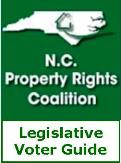 RALEIGH – The N.C. Property Rights Coalition has published the N.C. Property Rights Voter Guide, Chairman Kieran Shanahan has announced. The voter guide, which lists candidates’ positions on a potential state constitutional amendment to prevent eminent domain abuse, is posted online at www.ncpropertyrights.com.
RALEIGH – The N.C. Property Rights Coalition has published the N.C. Property Rights Voter Guide, Chairman Kieran Shanahan has announced. The voter guide, which lists candidates’ positions on a potential state constitutional amendment to prevent eminent domain abuse, is posted online at www.ncpropertyrights.com. “The legislature had the opportunity to provide North Carolina’s property owners with real protection during the recent short session,” Shanahan said. “Unfortunately, their efforts fell far short. Instead of allowing the people to vote on a constitutional amendment that would stand the test of time, the legislature passed a law that can easily be undone by the whims of a future legislature.”
“The people of our state deserve more than this watered-down legislation,” Shanahan continued. “They deserve constitutional protection that will stand the test of time. That’s why we need an amendment to the state constitution to protect our private property from eminent domain abuse.”
“During the recent legislative short session, the House Judiciary 3 Committee refused to hear a bill calling for an amendment to the state constitution to prevent governments from using eminent domain authority to take land for private economic development projects,” Shanahan added. “The bill was sent to the House Rules Committee to die without fair consideration.”
“I’ve heard people say things like, ‘that could never happen in North Carolina’”, Shanahan added. “I’m sure Susette Kelo felt the same way – up until that tragic day when the city of New London, Connecticut decided that a developer could make better use of her home and began the process of seizing it through eminent domain abuse. Property rights are a fundamentally important issue, and North Carolinians cannot take them for granted.”
“The people of North Carolina deserve better protection than the legislature has given them,” Shanahan concluded. “North Carolinians need more than a legislative smokescreen – we need the kind of real protection provided by a constitutional amendment. Our organization will continue to call on the members of the North Carolina General Assembly to do what is right by allowing our citizens to vote on a constitutional amendment to protect our private property from eminent domain abuse. Private property rights are one of the foundational principles of our republic, and this important issue should be addressed as soon as possible.”
